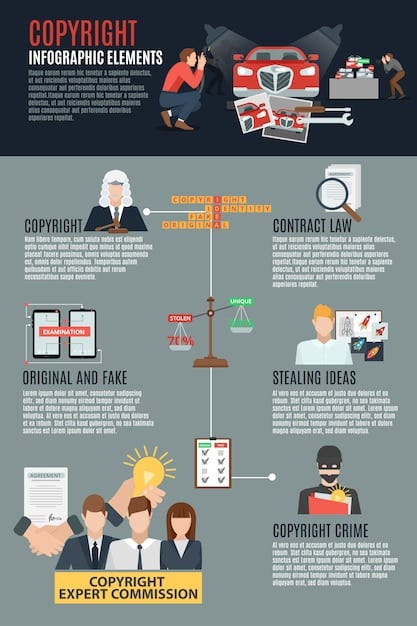Lobbying Compliance: Understanding Disclosure Requirements in the US

Lobbying compliance in the US involves understanding and adhering to disclosure requirements when attempting to influence legislation, ensuring transparency and accountability in the political process. These regulations are crucial for maintaining ethical standards.
Understanding lobbying compliance is crucial for anyone seeking to influence legislation in the United States. But what exactly does it entail? It’s more than just advocating for a cause; it involves navigating a complex web of disclosure requirements designed to ensure transparency and accountability.
This article delves into the intricacies of lobbying compliance: understanding disclosure requirements when influencing legislation, providing insights into the regulations, who they affect, and how to navigate them effectively.
Understanding Lobbying Compliance: What You Need to Know
Lobbying compliance refers to the legal and ethical obligations that individuals and organizations must follow when engaging in activities aimed at influencing legislation or government policy. These obligations primarily revolve around disclosing lobbying activities to the relevant government authorities, providing transparency into who is attempting to influence lawmakers and what their interests are.
Lobbying compliance: understanding disclosure requirements when influencing legislation is essential for maintaining the integrity of the democratic process. Without proper disclosure, the public and lawmakers would be unaware of the sources of influence, potentially leading to decisions that are not in the best interest of the citizenry.

Key Components of Lobbying Compliance
Navigating the world of lobbying compliance involves several key components. Compliance with these elements is necessary, if you want to avoid fines or negative impacts on the reputation of your business. Here are a few key components:
- Registration: Many jurisdictions require lobbyists to register with a designated government entity before engaging in lobbying activities. This registration typically involves providing information about the lobbyist, their employer or client, and the issues they intend to lobby on.
- Reporting: Lobbyists are often required to file regular reports detailing their lobbying activities. These reports may include information about the specific legislation or government actions they attempted to influence, the dates and nature of their contacts with government officials, and the amount of money they spent on lobbying activities.
- Record-keeping: Lobbyists must maintain detailed records of their lobbying activities, including who they contacted, when they contacted them, and what was discussed. These records are necessary for preparing accurate and complete reports.
The consequences of failing to comply with lobbying regulations can be severe, including fines, civil penalties, and even criminal charges in some cases. Additionally, non-compliance can damage a lobbyist’s reputation and credibility, making it more difficult for them to effectively advocate for their clients in the future. Staying informed on required legislation is key.
Who Needs to Worry About Lobbying Compliance?
Lobbying compliance isn’t just a concern for professional lobbyists. A wide range of individuals and organizations may need to be aware of and adhere to lobbying regulations, depending on their activities and level of engagement. The key question is will this improve your product? If yes, then it is a must.
Lobbying compliance: understanding disclosure requirements when influencing legislation is important information for associations, companies, and even activist groups. Here are some key groups of stakeholders who should be aware of lobbying regulations:
Groups that Need to Comply
- Professional Lobbyists: Individuals who are paid to represent the interests of clients before government bodies are subject to lobbying laws.
- Trade Associations: Associations often engage in lobbying on behalf of their member companies.
- Corporations: Corporations may lobby directly through their in-house government affairs departments or by hiring outside lobbying firms.
- Non-profits: Non-profit organizations may engage in lobbying to advance their missions.
Volunteer work can also lead to lobbying. Even if activities are done on a voluntary basis, if they meet the threshold for lobbying under applicable laws, disclosure may be required. Understanding the specific regulations in your jurisdiction is the first step to staying compliant.
Navigating Disclosure Requirements for Lobbying Activities
Successfully navigating lobbying compliance requires carefully tracking and reporting lobbying expenditures, political contributions, and communications as required by law. One of the critical parts of lobbying compliance: understanding disclosure requirements when influencing legislation is this required tracking.
Here are some steps to navigate the disclosure requirements:
Key Steps to Compliance
- Understand the Laws: Familiarize yourself with the specific lobbying laws and regulations at the federal, state, and local levels that apply to your activities.
- Identify Lobbying Activities: Determine which of your organization’s activities meet the definition of lobbying under applicable laws.
- Track Lobbying Expenses: Implement a system for tracking all expenses related to lobbying activities.
- File Required Reports: Prepare and file all required reports accurately and on time.
Seeking expert guidance is crucial. Lobbying laws can be complex and vary significantly depending on the jurisdiction. If your organization engages in lobbying activities, is important to seek guidance from legal counsel experienced in lobbying compliance.

Best Practices for Ensuring Lobbying Compliance
Ensuring lobbying compliance requires more than just understanding the laws and regulations. It requires implementing a proactive approach to promote ethical conduct within the organization. The following tips for lobbying compliance: understanding disclosure requirements when influencing legislation can ensure that you stay above board in all of your lobbying activities.
Here are some best practices your organization can follow to ensure lobbying compliance:
Tips to Ensure Compliance
- Develop a Written Compliance Policy: Create a written policy that outlines your organization’s commitment to lobbying compliance and provides guidance to employees and representatives on how to comply with applicable laws.
- Provide Regular Training: Conduct regular training sessions for employees and representatives who engage in lobbying activities, to ensure that they understand their obligations and how to comply with applicable laws.
- Conduct Internal Audits: Conduct periodic internal audits to assess your organization’s compliance with lobbying laws and regulations.
- Enforce Disciplinary Measures: Establish and enforce disciplinary measures for employees and representatives who violate your organization’s lobbying compliance policy.
Additionally, staying informed is key. Lobbying laws and regulations can change frequently, so it is important to stay up-to-date on the latest developments. Subscribe to industry publications, attend conferences, and participate in webinars to stay informed about changes to lobbying laws and regulations.
The Role of Technology in Streamlining Lobbying Compliance
In today’s digital age, technology plays an increasingly important role in streamlining and simplifying lobbying compliance efforts. Compliance tools can help organizations better manage their data related to lobbying compliance: understanding disclosure requirements when influencing legislation. These tools ease the burden of compliance.
Here are a few examples of how technology is used in lobbying compliance:
Examples of Technology
Incorporate lobbying software solutions to streamline reporting:
- Lobbying Software: Lobbying software can help organizations track lobbying activities, manage lobbying expenses, prepare lobbying reports, and submit reports electronically to government agencies.
- Database Management Systems: Database management systems can help organizations store and organize information about government officials, legislation, and lobbying contacts.
- Online Research Tools: Online research tools can help organizations stay up-to-date on the latest lobbying laws and regulations.
By leveraging technology effectively, organizations can streamline their lobbying compliance efforts, reduce the risk of errors, and improve the accuracy and completeness of their lobbying reports. This will make compliance work for you, not against.
| Key Aspect | Brief Description |
|---|---|
| 📝 Registration | Registering with the government to disclose lobbying activities. |
| 📊 Reporting | Submitting regular reports on lobbying efforts & expenses. |
| 🔍 Record-Keeping | Maintaining detailed records of lobbying activities. |
Frequently Asked Questions
The disclosure requirements for lobbying compliance: understanding disclosure requirements when influencing legislation typically include registering as a lobbyist, regularly reporting lobbying activities and expenses, and maintaining detailed records.
An individual who is paid or receives significant compensation to influence legislation or government action is generally considered a lobbyist.
Consequences can include fines, civil penalties, and even criminal charges in some cases. Additionally, non-compliance can damage a lobbyist’s reputation and credibility.
Lobbying software, database management systems, and online research tools. There are many possibilities to help simplify reporting and the tracking of lobbying activities for your business.
The policy should outline the organization’s commitment to compliance, provide guidance on following applicable laws, and provide procedures for reporting and investigating potential violations of lobbying compliance: understanding disclosure requirements when influencing legislation.
Conclusion
Navigating lobbying compliance: understanding disclosure requirements when influencing legislation can be challenging, but understanding who needs to comply, what regulations are relevant, and how to implement best practices is key. By proactively addressing these issues, organizations can ensure compliance and maintain credibility.
Ultimately, prioritizing lobbying compliance fosters transparency and accountability. Staying informed, seeking expert advice, and leveraging technology can help organizations navigate the complexities of lobbying laws and regulations.





